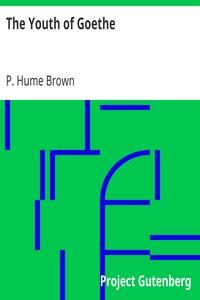|
|
Read this ebook for free! No credit card needed, absolutely nothing to pay.Words: 75782 in 18 pages
This is an ebook sharing website. You can read the uploaded ebooks for free here. No credit cards needed, nothing to pay. If you want to own a digital copy of the ebook, or want to read offline with your favorite ebook-reader, then you can choose to buy and download the ebook.

: The Youth of Goethe by Brown P Hume Peter Hume - Authors German 18th century Biography; Authors German 19th century Biography; Goethe Johann Wolfgang von 1749-1832 Childhood and youth.@FreeBooksTue 06 Jun, 2023 viously derived encouragement and stimulus; as a State official, he adds, he could be on easy terms with nobody without running the risk of a petition for some favour which he might or might not be able to confer. For the portrayal of the youthful Goethe materials are even superabundant; of no other genius of the same order, indeed, have we a record comparable in fulness of detail for the same period of life. And it is this abundance of information and the extraordinary individuality to whom it relates that give specific interest to any study of Goethe's youth. From month to month, even at times from day to day, we can trace the growth of his character, of his opinions, of his genius. And the testimonies of his contemporaries are unanimous as to the unique impression he made upon them. "He will always remain to me one of the most extraordinary apparitions of my life," wrote one; and he expressed the opinion of all who had the discernment to appreciate originality of gifts and character. What they found unique in him was inspiration, passion, a zest of life, at a pressure that foreshadowed either a remarkable career or disaster. It was said of Goethe in his latest years that the world would come to believe that there had been, not one, but many Goethes; and, as we follow him through the various stages of his youth, we receive the same impression. It results from this manifoldness of his nature that he defies every attempt to formulate his characteristics at any period of his life. In the present study of him the object has been to let his own words and actions speak for themselves; any conclusions that may be suggested, the reader will thus have it in his own power to check. I have cordially to express my gratitude to Dr. G. Schaaffs, Lecturer in German in the University of St. Andrews, and to Mr. Frank C. Nicholson, Librarian in the University of Edinburgh, for the trouble they took in revising my proofs. P.H.B. Edinburgh. THE YOUTH OF GOETHE EARLY YEARS IN FRANKFORT In his seventy-fifth year Goethe remarked to his secretary, Eckermann, that he had always been regarded as one of fortune's chiefest favourites, and he admitted the general truth of the impression, though with significant reserves. "In truth," he added, "there has been nothing but toil and trouble, and I can affirm that throughout my seventy-five years I have not had a month's real freedom from care." Goethe's biographers are generally agreed that his good fortune began with his birth, and that the circumstances of his childhood and boyhood were eminently favourable for his future development. Yet Goethe himself apparently did not, in his reserves, make an exception even in favour of these early years; and, as we shall see, we have other evidence from his own hand that these years were not years of unmingled happiness and of entirely auspicious augury. In one circumstance, at least, Goethe appears to have considered himself well treated by destiny. From the vivid and sympathetic description he has given of his native city of Frankfort-on-the-Main we may infer that he considered himself fortunate in the place of his birth. It is concurrent testimony that, at the date of Goethe's birth, no German city could have offered greater advantages for the early discipline of one who was to be Germany's national poet. Its situation was central, standing as it did on the border line between North and South Germany. No German city had a more impressive historic past, the memorials of which were visible in imposing architectural remains, in customs, and institutions. It was in Frankfort that for generations the German Emperors had received their crowns; and the spectacle of one of these ceremonies remained a vivid memory in Goethe's mind throughout his long life. For the man Goethe the actual present counted for more than the most venerable past; and, as a boy, he saw in Frankfort not only the reminders of former generations, but the bustling activities of a modern society. The spring and autumn fairs brought traders from all parts of Germany and from the neighbouring countries; and ships from every part of the globe deposited their miscellaneous cargoes on the banks of the river Main. In the town itself there were sights fitted to stir youthful imagination; and the surrounding country presented a prospect of richness and variety in striking contrast to the tame environs of Goethe's future home in Weimar. Dr. Arnold used to say that he knew from his pupils' essays whether they had seen London or the sea, because the sight of either of these objects seemed to suggest a new measure of things. Frankfort, with its 30,000 inhabitants, with its past memories and its bustling present, was at least on a sufficient scale to suggest the conception of a great society developing its life under modern conditions. For Goethe, who was to pass most of his days in a town of some 7,000 inhabitants, and to whom no form of human activity was indifferent, it was a fortunate destiny that he did not, like Herder, pass his most receptive years in a petty village remote from the movements of the great world. In these years he was able to accumulate a store of observations and experiences which laid a solid foundation for all his future thinking. Goethe's mother has found a place in German hearts which is partly due to the portrait which her son has drawn of her, but still more to the impression conveyed by her own recorded sayings and correspondence. Goethe's tone, when he speaks of his father, is always cool and critical; of his mother, on the other hand, he speaks with the feelings of a grateful son, conscious of the deep debt he owed to her. His relations to her in his later years have exposed him to severe animadversion, but their mutual relations in these early years present the most attractive chapter in the record of his private life. Married at the age of seventeen to a husband approaching forty, the mother, as she herself said, stood rather as an elder sister than as a parent to her children. And her own character made this relation a natural one. An overflowing vitality, a lively and never-failing interest in all the details of daily life, and a temperament responsive to every call, kept her perennially young, and fitted her to be the companion of her children rather than the sober helpmate of such a husband as Herr Goethe. How, by her faculty of story-telling, she ministered to the side of her son's nature which he had inherited from herself Goethe has related with grateful appreciation. But he owed her a larger debt. It was her spirit pervading the household that brought such happiness into his early home life as fell to his lot. A commonplace mother and a prosaic father would have created an atmosphere which, in the case of a child with Goethe's impressionable nature, would permanently have affected his outlook on life. For the future poet, the mother was the admirable nurse; she fed his fancy with her own; she taught him the art of making the most of life--a lesson which he never forgot; and she gave him her own sane and cheerful view of the uncontrollable element in human destiny. For the future man, however, we may doubt whether she was the best of mothers. Her education was meagre--a defect which her conscientious husband did his best to amend; and all her characteristics were fitted rather to evoke affection than to inspire respect. Though her son always speaks of her with tender regard, his tone is that of an elder brother to a sister rather than of a son to a parent. She was herself conscious of her incompetence to discharge all the responsibilities of a mother which the character of the father made specially onerous. "We were young together," she said of herself and her son, and she confessed frankly that "she could educate no child." Thus between an unsympathetic father and a mother incapable of influencing the deeper springs of character, Goethe passed through childhood and boyhood without the discipline of temper and will which only the home can give. And the lack of this discipline is traceable in all his actions till he had reached middle life. Wayward and impulsive by nature, he yielded to every motive, whether prompted by the intellect or the heart, with an abandonment which struck his friends as the leading trait of his character. "Goethe," wrote one of them, "only follows his last notion, without troubling himself as to consequences," and of himself, when he was past his thirtieth year, he said that he was "as much a child as ever." There was another member of the family of whom Goethe speaks with even warmer feeling than of his mother. This was his sister Cornelia, a year younger than himself, and destined to an unhappy marriage and an early death. Of the many portraits he has drawn in his Autobiography, none is touched with a tenderer hand and with subtler sympathy than that of Cornelia. Goethe does not imply that she permanently influenced his future development; for such influence she possessed neither the force of mind nor of character. But to her even more than to the mother he came to owe such home happiness as he enjoyed in the hours of freedom from the father's pedagogic discipline. She was his companion alike in his daily school tasks and his self-sought pleasures--the confidant and sharer of all his boyish troubles. To no other person throughout his long life did Goethe ever stand in relations which give such a favourable impression of his heart as his relation with Cornelia. The memory of her was the dearest which he retained of his early days; and the words in which he recalls her in his old age prove that she was an abiding memory to the end. Free books android app tbrJar TBR JAR Read Free books online gutenberg More posts by @FreeBooks
: Six Little Bunkers at Aunt Jo's by Hope Laura Lee - Siblings Juvenile fiction; Aunts Juvenile fiction; City and town life Juvenile fiction; Boston (Mass.) Juvenile fiction Children's Book Series@FreeBooksTue 06 Jun, 2023

: Phantom Wires: A Novel by Stringer Arthur Brown Arthur William Illustrator - Married people Fiction; Crime Fiction; Electricity Fiction@FreeBooksTue 06 Jun, 2023
|
Terms of Use Stock Market News! © gutenberg.org.in2025 All Rights reserved.






